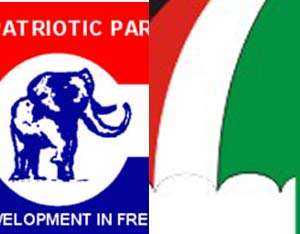
In intervening in Libya, one thing UN chief Ban Ki-Moon said that stuck with me was that they were not being neutral, but non-partisan. The intervention in Libya is another matter altogether, what I'm interested in is what it means to be non-partisan and not neutral, particularly in a polarised political environment like what we have in Ghana.
Twenty years of uninterrupted multi-party democracy in Ghana has not been enough to change the perception that the majority of Ghanaians have about politics or politicians. If anything at all, that poor perception has been reinforced by actions and statements of politicians and political parties. Politics is generally regarded as a 'dirty game' with the two leading parties, the National Democratic Congress (NDC) and the New Patriotic Party (NPP), being blamed for the worst offences.
As I already pointed out in a previous post (http://jeromewrites.blogspot.com/2012/04/winner-takes-all-in-ghana-politics.html), Ghana's politics is a winner takes all kind, and siding or being seen to side with a party, automatically means you are against the other party. Finally, both parties don't trust each other. They have vilified themselves to the extent that they see nothing good in each other. Because of these things, most Ghanaians expect the clergy to be strictly neutral. When Rev. Dr Asante-Antwi, former president of the Methodist Church of Ghana, openly endorsed the NPP's candidate for the 2012 elections, he came under criticism for dabbling in party politics and by so doing, alienating some of his flock.
My opinion is that the respect Ghanaians have for the clergy could be affected if they take partisan positions. Our politics is not like that of the US, where the clergy are openly aligned to political parties and no one seems to have a problem with that. However, the Ghanaian clergy cannot remain neutral on some issues. They have the power to serve as a voice of reason. They can however not achieve this if they are seen to be towing a line to benefit a political party.
The Catholics Bishops' Conference was criticised by the NDC because they supported the call by the NPP for a biometric verification system for the 2012 elections. The Ghana Pentecostal Council and the National Association of Christian and Charismatic Churches were also criticised by the NPP for condemning Nana Addo's 'All die be die' comments, while NDC criticised the Christian Council for failing to condemn it. Most recently, Alliance for Accountable Governance (AFAG), an NPP group, called the Christian Council 'hypocrites' for condemning Hon. Kennedy Agyepong's ethnically charged comments while not commenting on reports of violence in the biometric voter registration exercise.
My call to the clergy is for them to remain non-partisan not neutral. When issues that are crucial for our nation are being lost in a partisan struggle, they have the moral responsibility to say things as they are. As long as Ghanaians have faith that they push the agenda of Ghana and not of any party, they have the right to pick a side in an argument, no matter who may be pleased or not.
Jerome Wematu Kuseh
[email protected]
readjerome.blogspot.com




 We’ll protect state wealth from opaque deals – Prof Jane Naana
We’ll protect state wealth from opaque deals – Prof Jane Naana
 Mauritania president says running for second term in June polls
Mauritania president says running for second term in June polls
 I won't ever say I was a mere driver’s mate' — Prof. Opoku-Agyemang
I won't ever say I was a mere driver’s mate' — Prof. Opoku-Agyemang
 2024 polls: 'EC struggling to defend credibility'— Prof. Opoku-Agyemang
2024 polls: 'EC struggling to defend credibility'— Prof. Opoku-Agyemang
 Akufo-Addo gov't's 'greed, unbridled arrogance, unrestrained impunity, sheer dis...
Akufo-Addo gov't's 'greed, unbridled arrogance, unrestrained impunity, sheer dis...
 Election 2024: Ghana needs an urgent reset, a leadership that is inspiring – Ma...
Election 2024: Ghana needs an urgent reset, a leadership that is inspiring – Ma...
 Partner NDC to rollout a future of limitless prospects – Prof Jane Naana Opoku-A...
Partner NDC to rollout a future of limitless prospects – Prof Jane Naana Opoku-A...
 NPP will remain in gov’t till Jesus comes — Diana Asamoah
NPP will remain in gov’t till Jesus comes — Diana Asamoah
 Sunyani Technical University demands apology from former SRC president over sex-...
Sunyani Technical University demands apology from former SRC president over sex-...
 'Dumsor' was resolved by Mahama but ‘incompetent' Akufo-Addo has destroyed the g...
'Dumsor' was resolved by Mahama but ‘incompetent' Akufo-Addo has destroyed the g...
